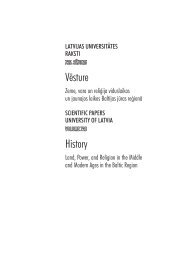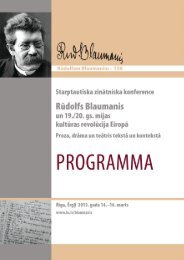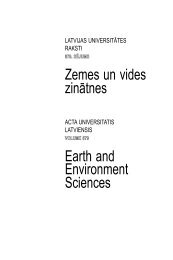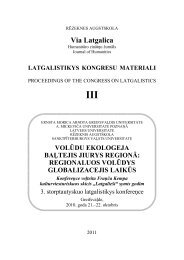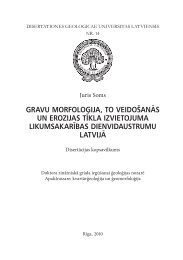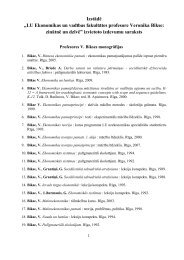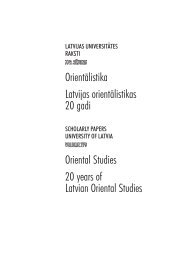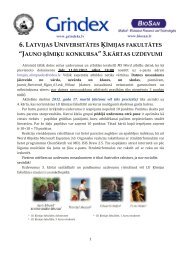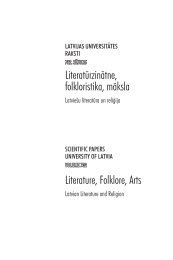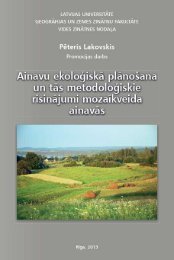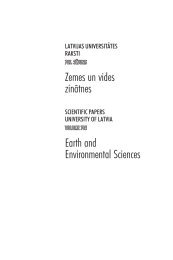Untitled
Untitled
Untitled
Create successful ePaper yourself
Turn your PDF publications into a flip-book with our unique Google optimized e-Paper software.
60 LITERATÛRZINÂTNE, FOLKLORISTIKA, MÂKSLA<br />
around with the genres of autobiographic novel, confession, and public speech (or<br />
academic presentation) and presents itself as a report on a research project, interspersed<br />
with poetic fragments, was perceived as an insult to literary taste1 . Zabuzhko’s<br />
novel “breaks many of elite literature’s laws…, it is overtly political…, always pressing<br />
the boundaries of established genres” 2 . And indeed, this writing is an infringement<br />
upon the laws of the novel as a genre3 .<br />
That is why, while the title of the novel apparently stresses the veracity of the<br />
facts presented (with the allusions to academic research), the text itself erodes any<br />
autobiographic truthfulness. For example, the prefix “auto–”, which is always “the<br />
single, imperious sight of the self express” 4 , never appears in the text; this underlines<br />
the impossibility of establishing power relations between author and text, narrator<br />
and narration. This is additionally confirmed by the lack of a stable narrator in the<br />
text, which is also a violation of the narrative laws of autobiography as a manifestation<br />
of the power of a male mind over his personality and life. In the novel, the narrative<br />
shifts between the first, second, and third person narrators, which seem to have<br />
different identities and to address different issues. For example, global perspectives<br />
issues related to Ukraine and the Ukrainian nation, are always presented by the first<br />
person narrator who is quite self–conscious and self–critical. Passages which discuss<br />
‘Ukrainian’ issues are usually preceded by a phrase emphasizing that the text is<br />
actually a public speech on a research project (“…the topic of my speech today, ladies<br />
and gentlemen, as it is stated in the program, is “Field Research in Ukrainian Sex<br />
…” 5 ) – with a bitter taste of irony to it (“Ladies and gentlemen, I feel a bit uncomfortable<br />
touching this topic since, of course, it fits a sermon better than a serious academic<br />
speech, and I already see that you are – one by one – leaving the room, sarcastically<br />
curling your lips: crazy stuff, typical Slavic mysticism…” 6 ). Second and third<br />
person narrators retell the personal stories of Oksana and her lover, Mykola, and the<br />
story of their relationship. But however intimate the tone of the story might be, there<br />
is always an ironic undertone, concealing rage, or humiliation, or helplessness.<br />
From my point of view, a separation of the narrative voices in the novel is necessary<br />
to distance the protagonist from her personal experience, thus distancing Field<br />
Research from autobiography once again. Through the second and third person narration,<br />
Oksana once again relives her relationship with Mykola, joining it with her<br />
family experience. The first person narration functions differently: it opens up a fictional<br />
space for the female perspective of the community she lived, and is living, in,<br />
a fictional space where Oksana’s personal experience became a representation of a<br />
communal experience.<br />
The personal enters Field Research in Ukrainian Sex with sex, namely with<br />
‘painful intercourse’ 7 , as referred to by the protagonist herself. Introduced in this<br />
novel, pure sexual relations, the whole discourse on female sexuality, that was never<br />
a literary topic in Ukrainian literature before, 8 are related with a number of issues that<br />
are still not only sensitive, but painful: the Famine of 1932–33, the purges, family relations<br />
within society affected by the fear of purges. On the one hand, such approach<br />
depathosizes the history of the community. On the other hand, in Spivak’s terms, it<br />
can be seen as an attempt of an intellectual to voice an experience that has been<br />
silenced, a ‘non–literary’ experience of a female in Ukrainian society.



